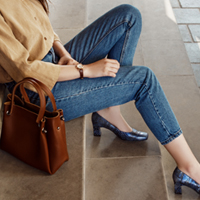Women’s Bottom-Wear: An Emerging Category
Published by Sharekhan Education | April 3, 2023

Amit Pathak | Sharekhan Education
Introduction:
Women’s Bottom wear has emerged as a universal wear product with an independent identity. It is not limited to the notion of ethnic wear or western wear. It has evolved from a lone churidar or leggings to several new categories like Palazzos, Pants, Cargos, and Denim Jeans. A single style of bottom wear can be mixed and matched with different outfits. Increasing preference for ‘Mix and Match’ styles vs. ‘Saree and Salwar-Kurta-Dupatta’ (SKD) has led to women’s bottom wear emerging as a separate category within women’s apparel.
About the apparel category:
Bottom wear is a core apparel category. It is less prone to heavy discounting. It has relatively fewer changes in designs and offers lower inventory obsolescence risk. Better comfort, more functionality, and in-demand styles enhance brand loyalty. The key to success in bottom-wear retailing is effective inventory management. Working capital (WC) is around 75% of the total capital employed. Higher WC is on account of multiple-color SKUs. Retailers must ensure that they own popular inventory with appropriate depth to increase inventory turnover.
Analysts estimate that the share of branded players in the sector will increase from 33% in FY20 to 46.8% by FY25. The proliferation of mall culture and the growth of organized retailers have conditioned consumers to the idea of an air-conditioned environment, facility of trial rooms, wide product range, price transparency, quality assurance, and on-floor service assistance. Branded players provide a superior retail experience through company-owned Exclusive Brand Outlets (EBOs). Experts estimate that the branded segment will experience a compound annual growth rate (CAGR) of 14% over the next decade.
Key Growth Drivers:
The key growth drivers for the sector are brand investments and distribution expansion. The consistent delivery of quality at affordable prices in smaller cities has been aiding the shift of customers from unorganized traditional shops to organized value retailers. The median age in India is around 28. The youth of the country predispose toward branded products. Brands are leveraging social media platforms for engagement with these customers. Aspirational buying is increasing as women become more financially independent and earn from a young age.
About Go Fashion:
Let us discuss Go Fashion in this space. The company actively designs, sources, markets, and distributes women’s bottom-wear products under the brand name ‘Go Colors’. It outsources the manufacturing of its products. Analysts estimate that the company will add 125 exclusive brand outlets (EBOs) annually over the next decade. It follows a cluster-based expansion model for store expansion and will open new stores in the vicinity of existing stores to get better brand recall and visibility. Analysts estimate that the company will deliver around a 25% compound annual growth rate (CAGR) in revenue and profits over FY23-26E.
To gain more knowledge of investing attend our free Power Money Workshops.
Disclaimer:
Investment in securities market are subject to market risks, read all the related documents carefully before investing. For detailed disclaimer and registered office details visit link – https://www.sharekhan.com/disclaimer/Sharekhan_Education.html




